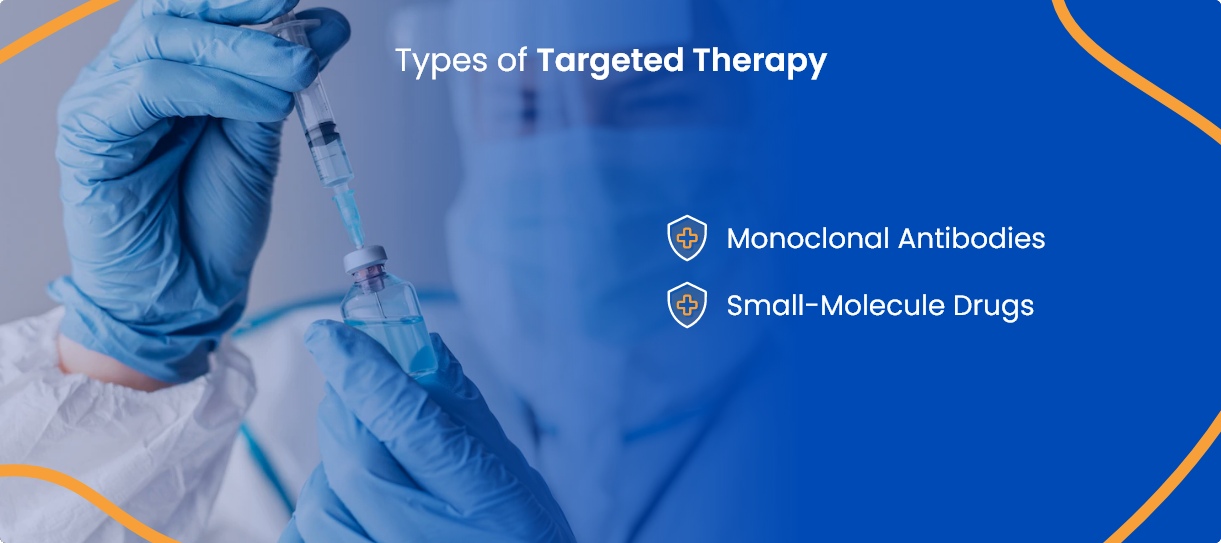
Book a Consultation
Thank you!
Your form has been sent successfully.

Targeted therapy is one type of cancer treatment that uses medicines designed to find and block specific changes in cancer cells. Because it focuses more precisely on cancer cells, targeted therapy often causes fewer side effects compared to traditional treatments like chemotherapy.
Your oncologist may recommend targeted therapy alone or together with other treatments such as chemotherapy, radiation therapy, or surgery.

Targeted therapies generally fall into two main types: monoclonal antibodies and small-molecule drugs.
Monoclonal antibodies are lab-made proteins that attach to targets on the outside of cancer cells or nearby areas. Small-molecule drugs are much smaller and can enter cells directly to block specific proteins that cancer cells need to grow.
Depending on your cancer, doctors might recommend one type or a combination of both.
Monoclonal antibodies work by attaching to certain targets on cancer cells, which can block growth signals or help your immune system recognize and remove cancer cells.
Because they work mainly on the cell surface or nearby tissues, these therapies generally do not enter the cell itself.
Examples of monoclonal antibodies include:
Your doctor will determine which is right for you based on your cancer’s unique characteristics and your overall health.
Small-molecule drugs are small enough to enter cancer cells, allowing them to target and block critical proteins inside the cells.
Many small-molecule therapies are taken orally as pills, making them a convenient option. Some can even block multiple cancer-driving proteins at once, providing a broader impact.
Targeted therapy works by stopping cancer cells from growing, spreading, or repairing themselves
Some medicines block the signals that tell cancer cells to multiply or survive. Others change the way proteins inside cancer cells work, leading to the death of those cells.
Certain targeted therapies also prevent tumors from growing new blood vessels. Without these vessels, the tumors cannot get the nutrients they need to keep growing, causing them to shrink or stop progressing.
Your oncologist may recommend targeted therapy alone or with other treatments such as chemotherapy, radiation therapy, or surgery.
Before using targeted therapy, your doctor will test your cancer cells to look for specific genes or proteins called "targets".
Targeted therapy only works if your cancer cells have the exact target that the medicine is designed to affect.
Not every cancer or patient will qualify, so testing your tumor or blood is an essential step in determining whether targeted therapy is right for you.
How targeted therapy is administered depends on your specific treatment. Some targeted drugs are taken by mouth as pills; others are delivered directly into your bloodstream through an IV at a treatment center.
Your treatment schedule will vary, but regular appointments for check-ups and scans will be necessary to see how your body responds.
Your care team will monitor you closely. Because it focuses more precisely on cancer cells, targeted therapy often causes fewer side effects than traditional treatments like chemotherapy
If a targeted therapy stops being effective, your oncologist will discuss next steps or alternative treatment options.
Bring these questions to your next visit to clarify your treatment plan and what you can expect:




While targeted therapies tend to have fewer side effects compared to traditional chemotherapy, you might still experience some common reactions. These can include fatigue, skin irritation or rashes, nausea, diarrhea, or increased blood pressure.
You can manage many of these side effects with simple self-care steps:
Always contact your care team promptly if you experience:
The cancer specialists at ACTC in Florida offer outstanding patient care by prescribing personalized and evidence-based treatment plans tailored to individual patients' needs.
We aim to foster a positive environment that focuses on physical and mental health throughout a cancer patient's journey.
The following are our providers whom you can consult at ACTC:

MD, Hematology & Oncology

MD, Ph.D., Hematology/ Medical Oncology

MD, Radiation Oncologist
At ACTC in Florida, our cancer specialists are backed up by qualified clinical staff with over two decades of experience. We guide you through diagnosis, staging, treatment, and long-term follow-up in one convenient location.
Call 352-345-4565 or book an appointment.

 352-345-4565
352-345-4565
Schedule a consultation by calling
 352-345-4565
352-345-4565